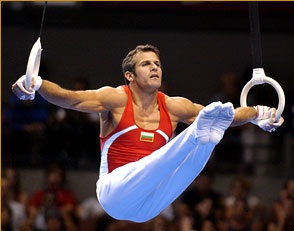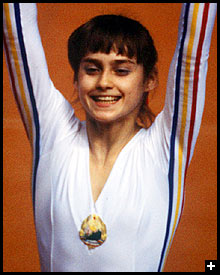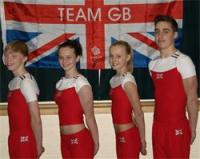Main Menu
Latest Blog Entry
User login
Eating disorders in gymnasts
Can gymnasts avoid eating disorders?
 Gymnastics is a very powerful sport needing an incredible amount of strength and power in order to perform routines on the floor or on equipment.
Gymnastics is a very powerful sport needing an incredible amount of strength and power in order to perform routines on the floor or on equipment.
Vault requires a very short amount of energy but the power produced to perform their skills is huge.
Beam, floor, bars and ring routines only last a couple of minutes but again, the stamina to keep repeating explosive movements, or holding themselves on their hands and in positions requires a lot too.
Gymnastics is a very aesthetic sport too. There is a lot of pressure for gymnasts in each discipline (rhythmic, artistic, and acrobatic) to look the stereotypical way that everyone associates with gymnastics.
A sport that requires some very high bursts of energy repeatedly, and the pressure on gymnasts to look small and lean is difficult to balance when it comes to their diets.
How much training is required to be a top gymnast?
Think of it this way, a gymnast’s week will include training 4-7days a week, possibly twice a day when a competition is due, and training sessions can last a few hours each time. During these training sessions they are performing their routines over and over again. The energy expenditure is huge!
On top of this is the pressure of body image and diet. A young gymnast will believe eating less will help them either stay small or get small.
Technically, they are right: to lose weight there should be a calorie deficit. But when this calorie deficit is taken to the extreme, performance will drop as the body will not be receiving enough energy to carry out what is required in training.
It will not be recovering which reduces the body’s ability to adapt and improve. Therefore, eating disorders are very common amongst gymnasts.
Unhealthy obsessions with food and fear of gaining weight can be classed as an eating disorder. The two extremes are called Anorexia Nervosa and Bulimia Nervosa.
What are Anorexia Nervosa and Bulimia nervosa?
- Anorexia – An eating disorder characterized by markedly reduced appetite or total aversion to food. Anorexia is a serious psychological disorder. It is a condition that goes well beyond out-of-control dieting… (full definition here )
- Bulimia – An eating disorder characterized by episodes of secretive excessive eating (binge-eating) followed by inappropriate methods of weight control, such as self-induced vomiting (purging), abuse of laxatives and diuretics, or excessive exercise... (full definition here med terms)

Nadia Comeneci
Three well known ex-gymnasts have suffered from these eating disorders: Cathy Rigby, Kathy Johnson and Nadia Comaneci (only gymnast to receive perfect 10 score).
Cathy Rigby suffered two cardiac arrests due to these disorders. All three have overcome them now.
One gymnast that really shocked the gymnastic world and made eating disorder come to light was Christy Henrich. At the age of 22, Christy died from multiple organ failure, weighing just 47 pounds. Christy was pressured to lose weight when an international judge told her she was fat in 1989.
After this, gymnasts started to come forward and admit to having eating disorders. Educational videos, counselling and classes then began to teach coaches and gymnasts. TV channels also stopped listing the weights of gymnasts and did not make comments.
Gemma Robertson
Further Reading
The body image pressure associated with competitive gymnastics is one of the main reasons we follow an Educational Gymnastics approach at our Gymnastics Club in Devon.
Client Testimonials
 Weston AGC
Weston AGC
I first met James at a South West Gymnastic conference and thought he was superb then, and still do! James' ability to adapt to different sports and levels is excellent, and he is superb at getting his message across to different ages of gymnasts. He did a workshop at our club for our competitive gymnasts and it was superb, His work was of great value to a wide range of ages and levels, with a tremendous emphasis on posture and injury prevention. We have been able to put his training methods into practice and are seeing an improvement in the all round strength and fitness of our gymnasts.
More


Comments
[…] Interested in starting gymnastics? Then join our gymnastics club in Willand, between Uffuclme and Cullompton. […]